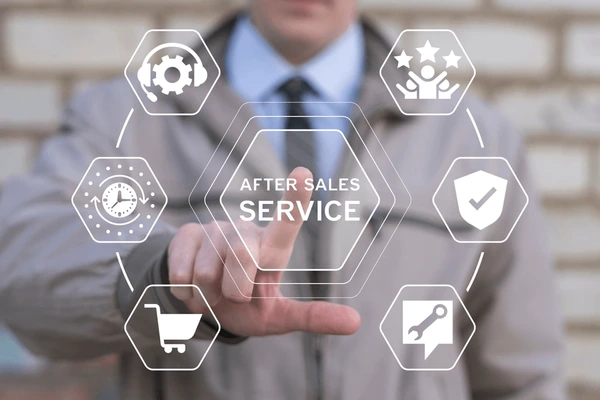The Crucial Role of After-Sales Service

(Source: shutterstock.com)
Why After-Sales Service Matters More Than Ever for Business Success
After-sales service refers to the support and assistance a business provides to customers after they’ve purchased a product or service. This ongoing engagement is crucial to maintaining satisfaction, fostering loyalty, and building lasting relationships. Studies have shown that retaining a customer is significantly more cost-effective than acquiring a new one—improving customer retention by just 5% can lead to profit increases between 25% and 95%. That makes after-sales service not just a nice-to-have, but a smart investment.
Whether through face-to-face assistance, phone support, emails, or online resources, after-sales service plays an essential role in ensuring that customers can fully benefit from what they’ve bought.
Why After-Sales Service Is a Strategic Advantage
Your most loyal customers—those who return to buy from you again—are not only likely to spend more over time, but also serve as advocates, recommending your business to others. This kind of organic word-of-mouth promotion is invaluable and is often driven by the quality of your support after the sale.
Offering excellent post-purchase service also differentiates your brand from competitors. Today’s consumers expect more than just a great product—they want assurance that help is available when they need it. Providing a high standard of care builds trust, strengthens your brand image, and allows you to charge a premium by enhancing perceived value.
Remember, a well-made product is not enough if the customer doesn’t know how to use it properly or struggles to get help when issues arise.
Different Types of After-Sales Support
After-sales strategies can vary depending on your business type, product complexity, and available resources. While large companies may have the resources to implement full-service programs, even small businesses can start with basic forms of support and scale up over time. Here are some commonly used after-sales services:
1. Delivery and Installation
For products that require setup, seamless delivery and professional installation services can create a lasting positive impression. Leveraging tools like mobile apps for field service tracking and documentation can streamline these processes.
2. Product Warranties
A clear, fair warranty policy signals that you believe in the quality of your offerings. Honoring warranties without unnecessary complications helps retain customers even when something goes wrong, and avoids pushing them toward your competitors.
3. Customer Training and Education
Ensuring that customers know how to use your products increases satisfaction and reduces support inquiries. Offer training at the time of installation or onboarding, and supplement it with digital guides, tutorials, and videos. Regular blog updates and instructional content can also boost SEO and customer engagement.
4. Technical Support
Support systems should cater to both immediate and long-term needs. This may include live chat, email support, or phone hotlines, along with a knowledge base or online forum. By resolving smaller issues through self-service options, your team can focus on more complex problems efficiently.
5. Hassle-Free Returns and Exchanges
Offering easy return policies demonstrates confidence in your products and reduces hesitation in the purchasing process. Even if a no-questions-asked return isn’t feasible, aim to minimize the friction—avoid hidden fees or confusing procedures.
6. Customer Discounts and Loyalty Rewards
For retail (B2C) customers, this might mean sending birthday vouchers or loyalty points. For business clients (B2B), offer volume-based discounts, incentives for long-term contracts, or special rates for repeat orders.
7. Referral Programs
Encourage happy customers to refer others by offering referral bonuses. This can be as simple as asking “Who referred you?” or as advanced as using trackable links and promo codes. Rewards can range from discounts and freebies to service credits.
Conclusion
Outstanding after-sales service enhances customer experience, reinforces your brand’s value, and drives long-term growth. In today’s competitive landscape, companies that invest in strong post-purchase support not only retain customers—they turn them into passionate promoters. Whether your business is large or small, B2B or B2C, prioritizing after-sales service is one of the smartest ways to sustain success.
Reference:




Comments :